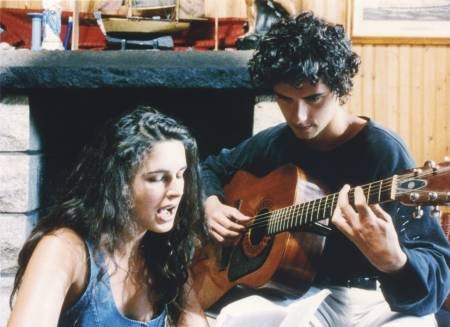 Gwenaëlle Simon and Melvil Poupaud in A Summer's TaleThe infinite horizons and sudden dead ends of romance
Gwenaëlle Simon and Melvil Poupaud in A Summer's TaleThe infinite horizons and sudden dead ends of romanceThis film of a tousle-haired young man at the beach tempted by three different young women seems, like a lot of Éric Rohmer's movies, to be about nothing, and then turns out to be about almost everything. All of Éric Rohmer's films about relationships (which most of them are) are in a sense classic in their simplicity, their typically French balance of the intellectual and the sensual, their constant focus on love and the best mate, and their absorption in endlessly fascinating conversation.
A Summer's Tale, which is only now in 2014 being released in the United States, is more classic, more pared down, than most. If you have not seen it, if you care about French culture or about cinema, run to see it. If you have seen it, run and see it again. (It has been out on video, but there won't be a US DVD of it for a bit yet.)
Every scene of
A Summer's Tale involves its protagonist, Gaspard (Melvil Poupaud, who was 23 at the time), a shy (but tall and good-looking) recent math graduate about to begin work, but also a composer of songs who plays the guitar, who goes to the busy resort town of Dinard in Brittany in the summer, and spends his weeks there contemplating his options. He has come to see Léna, who he thinks is the one for him. He would like to think she's his girlfriend, but there is little to prove that. He doesn't even know for sure if she's coming, or how to get in touch with the people she'll be staying with. His life, for this moment, revolves around Léna, and yet his relationship with her is surprisingly tenuous. But such is the confusion of elective affinities.
Gaspard, who when not on the beach tinkers with a song he's writing and taping in the style of a sea chanty, quickly becomes friends with a sweet young woman called Margot, a doctoral candidate in ethnography who is a waitress at a
café-crêperie where he goes to eat, and who sees him the next day on the beach. He meets Margot (Amanda Langlet), and they begin a pattern of daily meetings and conversations -- which sometimes end in kisses. But while Gaspard spends more time with Margot than with anyone else, it's assumed that she is just a friend, illustrating that one can talk more freely with a friend than with a lover or girlfriend. Talking always about the elusive Léna (who does eventually appear), Margot assumes Gaspard is not interested in
her, and suggests he might like her friend, or acquaintance, Solène (Gwenaëlle Simon). He sees her at a club where he goes with Margot to dance. Then he becomes involved in a flirtation with Solène. Now he's in trouble, because if Léna appears, what about Solène? And after all, what about Margot? With the three women at play, the possibilities are endless. Is this about nothing? In Gaspard's conversations with Margot, always with the underlying irony that their flirtation may be the most important one, the implications of his games and strategies multiply. The whole war of the sexes is here, and also all romance, all triumph and all disappointment, exultation and loss.
This reminds one of the line quoted by the protagonist Louis D'Ascoyne in the (also classic) Fifties Ealing comedy,
Kind Hearts and Coronets, "How happy would I be with either, were 'tother, dear charmer, away." In his conversations with Margot and Solène and his final encounter with Léna, what matters, as in most of Rohmer's films, is not the outcome, but the complex feelings and twists and turns of thought that Gaspard goes through in negotiating his desires and his uncertainties. And behind it all is the sly and wise smile of Rohmer, who is manipulating his puppets as they dance upon the beach, but makes it all seem casual and unplanned, while managing a beauty and elegance that only careful craft and art can produce. But it's a life-affirming craft and art, and Rohmer's true master, as he declared, was Renoir. This movie is above all a celebration of sunshine, color, and beautiful women.
A Summer's Tale/Conte d'été, 113 mins., came out in France 5 June 1996; it also showed at Toronto that September. US release 20 June 2014. Opens August 29, 2014 in the San Francisco Bay Area.
Several contemporary French reviews of the film can be read
here.





